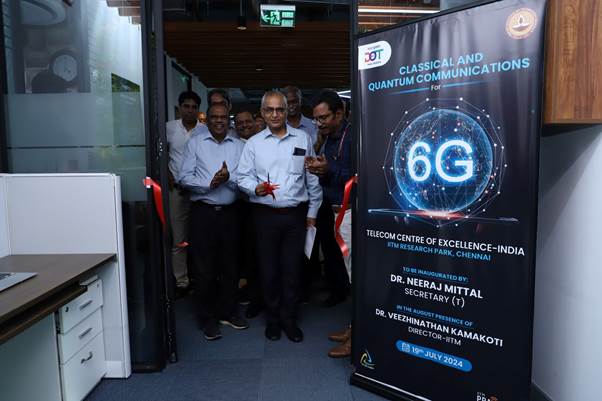
Dr Neeraj Mittal, Secretary (Telecom) has inaugurated a centre of excellence on “Classical and Quantum Communications for 6G” at IITM Research Park, Chennai. This is a sub-centre of Telecom Centres of Excellence (TCoE)-India and it will spearhead the development and deployment of 6G technology, promising unprecedented speeds, ultra-low latency, and enhanced connectivity. Shri Sanjeev Kumar Bidwai, Sp DGT, Tamil Nadu was among those present at the occasion.

Secretary (Telecom) emphasized that the final selected proposals will be categorized into groups based on their thematic & technical similarities, and in order to foster collaboration and maximize the impact of the R&D efforts in 6G technology, a comprehensive three-day workshop will be organized for the selected proposals. This workshop will bring all the proposers together at a single location, enabling them to synergize their research and development activities, share insights, and work towards common goals. The initiative aims to create a cohesive and coordinated effort in advancing 6G technology, ensuring that all projects benefit from collective expertise and resources.
A hub for innovation
The centre will serve as a hub for innovation, bringing together academic and industry experts to collaborate on cutting-edge projects. This collaborative environment will foster the development of new applications and services that leverage 6G’s capabilities. The centre will play a crucial role in shaping the standards and infrastructure for 6G networks worldwide.
This centre will also facilitate interconnect between the existing 5G Test Bed at IIT Madras which was developed indigenously through a collaborative project involving eight institutes and funded by the Department of Telecommunications (DoT), Ministry of Communications. The 5G Test Bed was inaugurated by Prime Minister Narendra Modi in May 2022, and has since been used extensively by industry and academia for testing new 5G products and use-cases.
“Bharat 6G Vision”
Prime Minister Shri Narendra Modi had released India’s 6G Vision “Bharat 6G Vision” document on March 23, 2023 which envisaged India to be a front-line contributor in design, development and deployment of 6G technology by 2030.
Bharat 6G Vision is based on principles of Affordability, Sustainability and Ubiquity. It ensures that India takes its rightful place in the world as a leading supplier of advanced telecom technologies and solutions that are affordable and contribute to the global good.
The 6th Generation or 6G Technology has been named ‘IMT 2030’ by ITU, the specialised agency for Information and Communication Technologies of United Nations. The term International Mobile Telecommunications (IMT) is the generic term used by the ITU community to designate broadband mobile systems. The recommendation of ITU for 6G Framework, approved on June 22, 2023; will serve as foundation document for 6G research and development and will pave way for development of 6G Technology worldwide.
The IMT-2030 framework highlights sustainability, security, and resilience, connecting the unconnected, and ubiquitous intelligence as overarching aspects which act as design principles commonly applicable to all usage scenarios. The framework identifies 15 capabilities for 6G technology, nine of which will be enhanced from existing 5G capabilities, including security and resilience, latency, mobility, connection density, peak data rate, and spectrum efficiency.
Department of Telecommunication has funded two next generation testbeds to advance the 6G research. Under the Bharat 6G Vision, DoT is already evaluating 470 proposals on “Accelerated research on 6G Ecosystem”.
******
AD/DK

